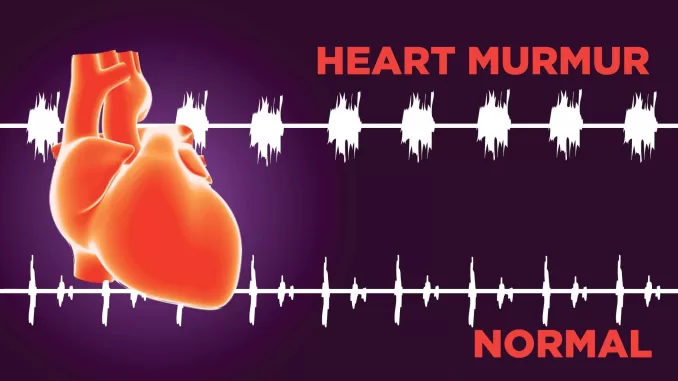
Heart Murmurs are whooshing sounds made by the rapid turbulence of blood as it flows through the heart. The sound can be heard by the use of a stethoscope. Sounds are produced from the closing of the heart valves. They may at times be harmless. However, some are indicators of a serious heart condition. They may be present at birth for infants or later in adult life.
Causes of heart murmur.
They are a result of:
- The heart fills with blood causing a diastolic murmur.
- Blood leaving the heart leads to a systolic murmur.
- Throughout the heartbeat leads to a continuous murmur.
There are two kinds of murmurs.
- Harmless. These are more common in newborns and children. It poses no serious health problems. Causes may be;
- Fever.
- Hyperthyroidism.
- Pregnancy.
- Anaemia.
- Exercise.
2. Worrisome heart murmurs.
Children and infants may have worrisome heart murmurs from a congenital heart defect. They Include:
- Cardiac shunts where there is irregular blood flow between heart chambers or in blood vessels.
- Holes in the heart e.g. atrial septal defects and ventricular septal defects. A hole forms before birth on the walls of the heart chambers.
In adults, the murmurs are from problems with the heart valve e.g. acquired heart valve disease. Conditions that can contribute to damage to the heart valves are:
- Calcium deposits e.g. degenerative valve disease. Calcium makes the valves stiff and narrow. A calcified valve may make the valves close completely. This makes blood flow backward.
- Rheumatic fever- rheumatic heart disease occurs when rheumatic fever affects the heart valves. The fever affects people who do not seek treatment or complete treatment for strep throat.
- Endocarditis-Infections of the inner heart lining and valves from bacteria or other germs. Germs are carried from the infected sites to the heart through blood. Murmurs occur when treatment is not administered.
Risk factors of Heart Murmurs
Children at risk include:
- Taniya Wright Bio, Wiki, DC News Now, Age, Education, Family, Children, Husband, Net Worth, and Career
- Brent Cameron bio-age, children, wife, net worth, career.
- Maria Menounos-age, husband, family, health, career.
- Meghan Markle bio-age, husband, children, career.
- Nicholas Cage age, family, wife, children, movies, net worth.
- Damon Matson Bio, Wiki, DC News Now, Age, Education, Family, Children, Wife, Net Worth, and Career
- NeNe Leakes Bio, Wiki, RHOA, Age, Education, Height, Family, Husband, Children, and Career
- Family history of heart problems linked to murmurs.
- Rubella in mothers during pregnancy.
- Mothers suffering from uncontrolled diabetes during pregnancy.
- Certain medications and drugs during pregnancy.
Conditions that can increase the risk are:
- Anaemia.
- Carcinoid syndrome.
- Heart valve disease.
- Endocarditis – These are infections that affect the lining of the heart.
- Cardiomyopathy- weak heart muscles.
- Hyperthyroidism.
- Rheumatic fever history.
- Disorders of the autoimmune e.g. lupus and rheumatoid arthritis.
- Pulmonary hypertension.
- Hypereosinophilic syndrome.
Prevention of Heart Murmurs
There is no known way to prevent heart murmurs. A healthy lifestyle can contribute to one having a healthy heart. This helped to decrease heart problems.
Diagnosis.
- Physical examination. By use of a stethoscope, the doctor can tell if the murmur is harmless or worrisome.
- Family medical history.
The doctor checks for :
- Volume- how loud the murmur is from a scale of 1-6.
- Pitch, whether it is high, medium, or low in pitch.
- Location of the murmur in the heart. whether it spread to the neck or the back.
- Timing of the murmur, when they occur.
- Sound changes with exercise or changing of body position.
Test include:
- Chest x-ray. Gives a view of the heart and the lungs.Can show enlargement of the heart.
- Echocardiogram is used as the main test. Determines the cause of a heart murmur. Sound waves create pictures of the beating heart. Shows the flow of blood throughout the heart and the valves.
- Electrocardiogram (ECG or EKG). It measures the electrical activity of the heart. Electrodes sensors are attached to the chest/arms or the legs. From the heart signals produced a health care provider can tell in case of heart problems.
- Cardiac catheterization. A cardiologist inserts a catheter into the blood vessels through the groins or wrist and guided it to the heart.
Treatment.
For innocent heart murmurs it is easy to treat them. They go away once the condition causing them is treated. For worrisome ones, treatment depends on the cause. Antibiotics are only recommended for people with; artificial heart valves or congenital heart defects. They prevent infections going to the heart.
Types of treatment used include:
1. Use of medications. These include:
- Use of anticoagulants. These blood thinners help to prevent blood clots. E.g warfarin, rivaroxaban, apixaban e.t.c. Irregular heartbeat better known as arrhythmias can cause blood clots.
- Diuretics- help to remove excess fluids from the body.
- To lower heart rate and blood pressure beta blockers are used.
- Angiotensin-converting enzyme inhibitors- lower blood pressure in cases of one having a heart murmur.
2. Surgery. Used to correct conditions causing heart murmurs e.g. leaky heart valves. Heart surgeries are done depending on the heart condition. Include:
- Open heart surgery.
- Robotic heart surgery.
- Catheter procedures.
- Invasive heart surgery.
- Mount Kenya University history, fees, courses
- List of best private primary schools in Kirinyaga County.
- How is The Lenana Boy school and location?
- Kenya Institute of special education, courses.
- Public Universities in Kenya
- The best private primary schools in Nyeri county.
- Bay head elementary school history, enrolment, programs offered.